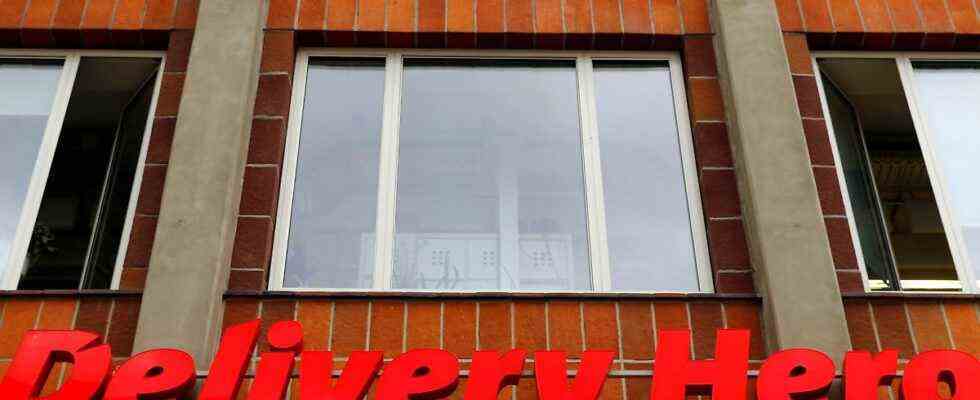Stock price collapses
Why Delivery Hero gets a beating
By Christiane Kreder and Hannah Schwär
02/11/2022, 11:45 am
Delivery Hero’s share price is in freefall. The profits of the corona pandemic have vanished into thin air. What’s next for the company?
No sooner had Delivery Hero published its business figures than a rapid sell-off of the company’s shares began. The Delivery Hero titles lost almost a third yesterday at the top. Within a day, the price dropped by more than 30 percent – and today it went down even further. Since November, the stock has known one direction in particular: down.
Delivery Hero even exceeded its growth target for 2021. But on the way to profitability, Delivery Hero still falls short of expectations. In 2021, the profit margin in relation to sales of the delivery platform was minus 2.2 percent, 2.0 percent had been announced. Also in 2022, Delivery Hero expects an operating loss of several million. The expected gross goods value of 44 to 45 billion euros, on the other hand, is conservative.
This is causing disillusionment among investors. “The company’s forecast clearly missed market expectations,” writes Manuel Mühl, analyst at DZ-Bank, in an analysis. He sees himself forced to reconsider his investment judgment and especially the fair value of the title. With the target for the gross goods value in 2022, Delivery Hero is six percent below market expectations, writes Jefferies analyst Giles Thorne.
Delivery Hero boss Niklas Östberg was unimpressed by the price drop on Thursday. “We believe the best thing for the company is to ramp up investments,” he said on a conference call with financial analysts. “We need to make sure we have the clout if we face tougher competition.”
Damned to rapid growth
Östberg relies on growth at any price. In the low-margin delivery business, only the industry leader has a chance of real profitability, he is convinced. Delivery Hero has therefore set itself the goal of becoming the market leader in all segments. Cost what it may. Östberg is oriented towards Amazon: the online retailer has also sacrificed short-term profits for long-term success for years. Alone: At Delivery Hero there is still no proof that the strategy is working.
The result is an aggressive growth strategy that swallows any revenue. On the one hand there are the expensive acquisitions, such as the takeover of the South Korean provider Woowa for 5.7 billion euros, the majority stake in the Spanish competitor Glovo and the entry into the Berlin delivery start-up Gorillas. On the other hand, Delivery Hero is advancing into the ultra-fast food delivery business and investing heavily in building its own logistics network. By the end of 2021, the company will have opened more than 1000 of its own mini warehouses, so-called Dmarts.
According to the growth figures, Östberg’s strategy is working: In the 2021 financial year, the gross goods value of the delivery platform – including partners – slightly exceeded expectations. Instead of 33 to 35 billion euros, Delivery Hero brought in 35.4 billion euros, an increase of 62 percent. The company’s own sales grew even more strongly by 89 percent to 6.6 billion euros and thus reached the upper end of expectations.
But this growth has come at a cost. What remains on the balance sheet are high losses. In the fourth quarter of 2021 alone, the group made an adjusted operating loss of almost 781 million euros before taxes, depreciation and amortization (Ebitda). That was almost a third more than in the same period last year. Delivery Hero’s mountain of debt is also considerable. At the end of 2021, the ratio of debt to equity was minus 271 percent.
The competition puts pressure on you
Delivery Hero recognized this weak point long ago. In order to get out of the red, Delivery Hero has already withdrawn from the highly competitive and cost-intensive German market. The Japan business is also to be sold. At the beginning of the year, Östberg finally announced to Manager Magazin that they “no longer wanted to be dependent on investors and have to raise capital”.
In the second half of the year, Delivery Hero wants to be in the black for the first time in terms of operating profit, with sales of 9.5 to 10.5 billion. Observers call the goals ambitious, because the business of the delivery service platform faces a number of challenges.
The end of the pandemic is likely to drive customers back to the restaurants – and the competition in the delivery service business is becoming increasingly powerful. At the same time, the dispute over drivers’ working conditions has alarmed the European authorities. “The food delivery industry is having a hard time in Europe because the authorities want to regulate heavily,” expects Manuel Mühl. “With the takeover of the Spanish company Glovo, Delivery Hero is taking another risk here.” The prospect of rising interest rates is likely to make itself felt for Delivery Hero in the form of more expensive loans – and thus make investments more expensive.
It remains to be seen whether the company’s growth strategy will be successful. Investors and investors already need a lot of patience. Because returns should not be an option for Delivery Hero in the medium term.
Tech stocks fall sharply
Delivery Hero is not the only company that recently had to accept a significant price drop. Many other tech titles, including large corporations such as Netflix and Meta, have also recently plummeted. “Tech stocks have performed very well over the past two years, but their high valuations are becoming increasingly vulnerable,” says analyst Muehl. “The market is incredibly nervous and more sensitive to bad corporate news and missed expectations.”
The mixture of an imminent turnaround in interest rates, its consequences for the economy and an imminent war in Ukraine currently has the markets firmly in its grip. Tech companies, which are often already working in the present with their expected profits from the future, are all the more nervous. “Companies that have been on the stock exchange for less time and tend to grow faster were sold off across the board,” said fund manager Jan Beckers at the end of January to “capital”.
While some fund companies, including Becker’s BIT Capital or Ark from star investor Cathie Wood, see the low in tech stocks as an incentive to get started, many investors are shifting down a gear and are increasingly focusing on defensive stocks again. “The sector rotation is in full swing,” says Mühl. “Growth stocks are being traded for cyclicals and value stocks.”
The article first appeared at Capital.de.


